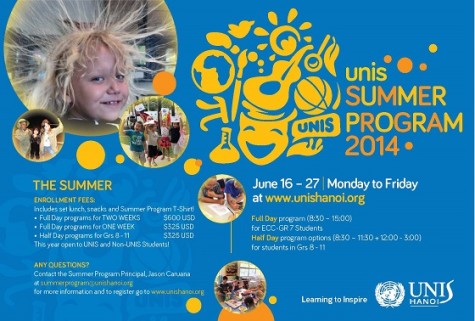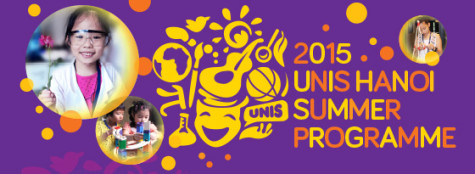UNIS Summer Programs Special
Ms. Sanchez gives her opinion in UNIS second year of the Summer Programs
Within a month, the Summer Program will start at UNIS Hanoi. Last year, the program received an immense amount of positive feedback from students. However, there are still many questions that students and parents about the program. Today, I have an interview with Ms. Sanchez – an Academic Writing teacher at the UNIS Summer Program both last year and this year.
Q: As an English teacher, what made you decide to teach in the Summer Program instead of going abroad for vacation?
A: First of all, we get 8 weeks to go abroad. There are so many vacations that you can do and enjoy it. But, I decided to do it this year, on my leaving year, because I did it last year. I really enjoyed the interaction with both the scholarships students and the individual students that came into the class. What Summer School different from the regular school is that the process is fun. There is no assessment, there is no MYP, and there is no criterion, so we can look at writing from a more creative angle. It allows us to have more fun with it. We don’t have the pressure of grades, numbers, and how to make it perfect. It becomes a creative process. It is a different way to look at writing. And I enjoy teaching kids that.
Q: How was the program last year? In your Academic Writing class
A: There are two components to it. One is the creative process: more about diaries, or novels, or narrative posts. Then there is the academic side, where we do look at grammar (Laugh), we look at some specific aspects of grammar to help us improve our writing, and we do look at the essay format. We put those two sides together, so we got the fun creative part as well as the academic part, all within 3 hours every day (Laugh). So it is a very busy class, in for every day, in two weeks.
Q: Describe the students attending the program in 3 words.
A: Engaging, enjoyable and energetic
Q: 2 weeks is actually a short time if someone wants to improve their writing skill, or any skill. What can students expect to achieve when the course is over?
A: I think “achieve” is a better understanding of students’ own processes and what it means to enjoy writing. As we go to school, we connect writing with assessment. But in Summer School, it is about enjoying that process again, and understanding that writing is not only about what is being graded. It is a reflection of you. It can come in the form of poetry, diary or even an academic essay. But the way to do it, how we improve it is something that comes from within. That is what I am trying to teach us: to enjoy the writing process and to understand that you own it, you are the owners of your writing, and it shouldn’t be writing to get a grade. “I am writing to improve.” “I am writing to be a better communicater.” “I am writing to create a beautiful short story.” If you look at writing in that perspective, when you go back to school, and you have to write for assessment, those are the things that you can obtain to get a better grade. That is what Summer School allows us to do, because we don’t have assessments (Laugh).

Q: The range of students for this course is from grade 8 to grade 11. Their skills must be different. What can you do to keep the balance between students to make everyone “happy”?
A: There is a different range of skill in every class that I teach as well. How I do is to look at where a certain student is. We will do the same thing, but at different levels. We are not robots. You may be at a different point in your writing, and I will give out the assignment and focus on that perspective with you. I think we have 10 students right now in the class, which is a great number. I hope it stays between 10 and 15, because it allows us to work and engage with you in different levels very easily. We have a chore of what our writing will be, and then I will group people based on their levels.
Q: In the previous answer, you said it is going to be a 3-hour class in the afternoon. It is quite a long time for a school period, and afternoon is when everyone is very tired. How will the program keep every student excited?
A: We will have movements and actions going on, but in a fun way (Laugh). It is hard as well. But writing is also about games and activities. I will include that in the process. We have story cubes, we have creative word board, and we have thing to engage people, like making some moves in the classroom. And also, if we need to take a walk outside, to refresh ourselves with some fund, and then come back to writing, we will, because it is a 3-hour class, and that takes 5 minutes of our time to wake us up (Laugh). There is a lot that we can incorporate to it. We can also bring what we enjoy. There is a writing activity where we can bring food – I am not going to give too much away (Laugh), and share something about favorite food, and we can eat all that food in class (Laugh). We will definitely be active in the writing process. We will not be sitting and writing in 3 hours. Writing is about thinking, and discussing, and creating ideas, and then putting them on paper. So you will not have pencil and paper for 3 straight hours. You will be engaging to create your writing before you write.
Q: Last year, the program has been very successful. Is there anything new that students taking Academic Writing can expect in this year program?
A: I think for students who take Academic Writing again will enhance their level. They will be in a differentiate group where they will be able to improve on what they did last year. Activities will be different. The story blocks and games weren’t there last year. They don’t have to think that “Oh my God, I still have to do the same thing.” The opportunity is that here is the narrated piece, and you choose the narrated piece that you want to write. If it is a short story that you chose to write last year, you can choose to write a diary or a speech, and mix it up. You can take the experience that you have this year in school, but not something that they did last year. The beautiful thing about writing and why I love writing so much is that we get to share the stories about ourselves. That is the new experiences, the new engaging experience that the students will have.
Thank you so much for a very interesting conversation.
I hope that the interview will make it clear some of the questions that students and parents still have for the Summer Program. I highly encourage students to take the UNIS Hanoi Summer Program, not only Academic Writing, but also with many other class that the program offered.





